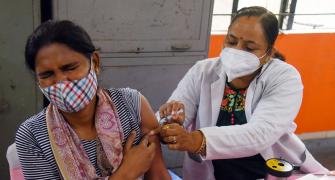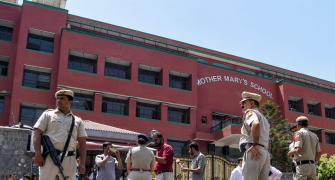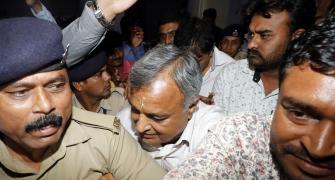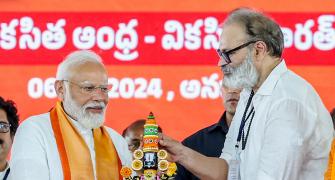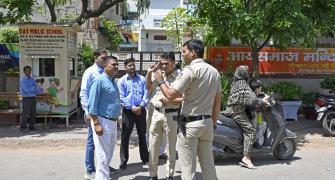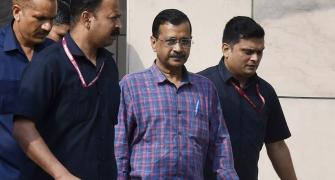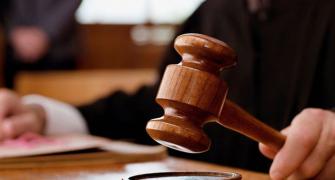If you are one of the many people who bought into Thomas L Friedman's idea that The World Is Flat, thanks to the information and technology, listen to this.
Here's an equally well-known journalist who says exactly the opposite and also says why technology, the same tool that Friedman uses to further his argument, is making the world we live in a not-so-flat one.
"Various people have various idea of how the world is. For example Tom Friedman says it is flat. To call the world flat or round or spherical would be misleading," BBC's World News Today presenter Nik Gowing (His one hour news capsule is aired in India at 9:30 pm from Monday to Friday) said at a discussion in Mumbai on Wednesday.
"In fact, apart from not being flat, it is a world where time lines are getting shortened," he said.
Explaining how the world is changing and how technology is playing a key role in it, he narrated how a picture taken in the southern tip of the world reaches the rest of the world in almost real time. "Likewise, soon after the assassination of Benazir Bhutto, the Pakistan government issued a statement saying she did not die in the suicide blast or of bullet injuries, but because of a head injury that was caused as she banged her head on the hatchet as she ducked. Imagine how the government would have looked when we aired these clips," he said, showing the audience video clips of a man shooting at the former premier and another clip that captured the flash of a gun going off right next to Bhutto.
He also spoke of how he had fixed an interview with Pakistan President Pervez Musharraf to discuss Pakistan's economy and how at the last minute -- with word coming in that at least a 100 ex-military leaders of Pakistan had demanded that Musharraf step down, saying he was very much part of the problem that the country is finding itself in -- the entire interview turned into a political one.
So, he again emphasised, "It would be wrong to call it flat or a little more lumpy or a little more bumpy."
Taking time off after the discussion, Gowing spoke to rediff.com's Krishnakumar P about the rise of India and China, the nuclear deal, terrorism and more.
In the last few years, the international media has shown a lot of interest in India's information technology boom, outsourcing and the increasing spending power of its middle class. Do you think the coverage has been balanced? Do you think India is the economic superpower that it is made out to be?
I just can't make a judgment. At least where I work, the coverage is balanced.
And, India is definitely not an economic super power yet. Not at the moment. It is moving towards it. It is doing the right things now. It's going to be many, many years. You need to look at the estimates how fast China and India are changing. I can't predict that. But, China will get there first.
Thomas Friedman has said India and China are like the tortoise and the hare and that India, having crossed the speed bump called democracy, may race ahead
I think you are using the wrong language. You have got the people's political representation. India and China are so different. I think what you are seeing is the recognition by the Chinese Communist Party that a lot is happening at the grassroots level.
You look at some of the things that they have done in their recent Congress, you see that they facilitating the betterment of people who have been deluded. They have realised that they have got a situation where people are being deluded. You can't ignore it. I don't think democracy is the word when you talk about the people's representation. The mobile phone has become a fantastic enabler and an empowerer. It is allowing people who earlier did not have a voice have a voice. To organise themselves in protest. Be careful with the kind of language you use. You have a democracy here in India. China can't be called a democracy by our standards. But I think they really are understanding the multi-cultural, multi-level representation of the people.
The current Indian government has been hyperactive in the foreign relations department, the highlight being better ties with the United States and the nuclear deal. What does a better relationship with the US mean for a country?
It is good to have positive relations. But of course, the nuclear deal is an irritant at this moment. There are problems in any relationships. But with the nuclear deal, it is not the problems with the relationship with America. It is the Left component of the United Progressive Alliance that is the problem. They are the ones who feel the nuclear deal does not bode well for India's interests. So, the Americans are irritated. The Bush administration is irritated. There is going to be an election in the US. It could be further delayed. Then, it will be leading up to your election here. My suspicion is nothing will be resolved till a new government is in place here in India and a new administration is in place in the US.
But India will have a price to pay for that, which will be another year lost, when you badly need energy. The implementation has a lead time of at least 10 years.
There was a time when India could say not a single Indian Muslim had any links with terror. That seems to have changed with the Glasgow attack. Why do you think of the phenomenon where people born or brought up in Britain are taking to terrorism?
There are studies that are trying to identify what the mistake is. There are studies that have clearly established why people from well to do homes and with very good educational backgrounds are involved in terrorism. If you are trying to profile the likely bombers, it is surprising why a doctor, whose job is to save lives, would kill people. The government can't oversee every doctor.
And another important thing is that the Al Qaeda central, as it is known, no longer has control over the source of terrorism. It has reached a level where it creates an idea and other people run away with it. Which is why well bred and well brought-up people are doing this.
You have tremendous first hand journalistic experience in Russia. What do you make of the events happening in Russia right now, like the way the opposition Other Russia movement -- chess champ Gary Kasparov was the face of it -- was muzzled? Can Russia come back to being the superpower it once was?
That is the way nationalist Russia is moving today. It is democracy, Russian style. At a time when oil prices touched $100 and now stand at $88, Russia is showing massive economic self confidence. The likely president in the future, Victor Zubkov, is urging Russian companies to go and buy foreign companies, just like the Americans did. President Vladimir Putin says he wants to make Russia the superpower it once was. They want to build new missiles. They have got new self confidence a new cockiness
There is a perception here in India that Pakistan is the hotbed of terrorism and that West is blind to this. What do you think is Pakistan's place in today's world?
Pakistan is very important. It is vital to the stability of your region and also for the rest of us. But it also depends on how you define Pakistan. The tribal areas along the Durand line [the porous border between Afghanistan and Pakistan] are for all purposes Afghanistan. But having said that, it is true that Pakistan is not having great success in curbing terrorism.
There is this big debate about whether newspapers are dying
Newspapers are not dying. Some of them are, but not all of them. Creating multiple platforms is the way to go forward and the newspaper must be a part of that. Look at what The Guardian and The Telegraph are doing in England. But in France, they have struck to the old idea of what a newspaper is, instead of having new media content.
And here in India, there is a newspaper renaissance going on. Creating a brand and getting good content up there to engage the reader is the way to go.
You were the one who brought the death of Princess Diana and you were on air for more than seven hours after the 9/11 attacks. Can you describe how you felt when you had to do it?
I have likened it to being a doctor. My job is to get it right on air. My job is not to worry about my emotions. For different reasons, I was very tired at the time Princess Diana's death came in. But when I had to go on air and make that announcement, there was no emotion. It's the same thing whether it is Diana or a disaster. You have to be cool and sharp in your observations and analyses.

